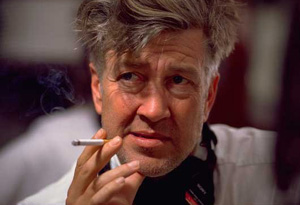 "Transcendental meditation speaks of inner preservation. Transcendental meditation gives you peace of mind."—Stevie Wonder
"Transcendental meditation speaks of inner preservation. Transcendental meditation gives you peace of mind."—Stevie WonderIn the September-October 2006 issue of Film Comment, Paul Schrader has a thought-provoking write-up—"Canon Fodder"—wherein he juggles his quandaries regarding what criteria should be used to determine cinematic masterworks. If there is to be anything close to a film canon, he suggests, it must be based on necessarily refurbished criteria, seven of which he posits for consideration: beauty, unity of form and subject matter, tradition, repeatability, viewer engagement, morality, and the one which I feel applies here—strangeness.
"Harold Bloom," Schrader writes, "uses the term 'strangeness' in lieu of the more common 'originality.' Strangeness is the type of originality that we can 'never altogether assimilate.' The concept of strangeness enriches the traditional notion of originality, adding the connotations of unpredictability, unknowability, and magic. To say that Jean Cocteau was original seems somehow thin; he was more than original, he was strange. Originality is a prerequisite for the canon—the matter at hand must be expressed in a fresh way—but it is the addition of strangeness to originality that gives these works their enduring status. This strangeness, this unpredictable burst of originality, is the attribute of a work of art that causes successive generations to puzzle over it, to debate it, to be awed by it. Strangeness is the Romantic's term and Hegel's and everyone else's thereafter—until supplanted by the more recent 'defamiliarization.' " (Film Comment, 42:5, p. 44, fn. omitted.)
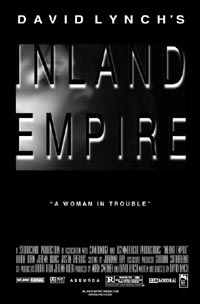 I have found no more accurate a summation of the work of David Lynch and his current project Inland Empire than Schrader's indirect description. One might even come to think of this posited criteria of strangeness as the Lynchian imperative.
I have found no more accurate a summation of the work of David Lynch and his current project Inland Empire than Schrader's indirect description. One might even come to think of this posited criteria of strangeness as the Lynchian imperative.From the moment reactions started trickling in for Inland Empire, I knew the film would require repeated viewings. So I caught it first at the Palm Springs International Film Festival—where there were surprisingly few walkouts among the film's capacity Camelot audience—and then again night before last at the San Rafael Film Center where David Lynch was in attendance to introduce the film and to field queries afterwards. Arriving at the Film Center two hours in advance, I was stunned to discover a rush line halfway down the block. Prudently, I had ordered my ticket online, picked it up at will call and joined Frako Loden and Joe Loree in line. They were conversing with a young fellow who had been at the front of the rush line since noon. He was jubilant. He had just been given a free ticket by someone who couldn't attend the screening. All very strange—and wonderful—indeed.
David Lynch introduced Inland Empire by offering a man with "an interesting stake in the present but always with a beautiful, haunting wind of the past; the rocker with the voice of gold"—Chris Isaak—who came on stage to perform a Mexican rancheria and his hit "Wicked Game", which Chris reminded his audience had been used in one of Lynch's movies. "I probably wouldn't have had a career," Isaak stated, "if not for David Lynch." "Baloney," Lynch protested. "Seriously," Isaak insisted, "I remember I went to Warner Brothers and said, 'Can we get a video for this?' and they said, 'No.' I said, 'Well David Lynch said he'd make one on his own time.' I remember it and I thank you for it."
Lynch then asked Isaak to play him a couple of his beautiful chords while he read a quote from the Aitareya Upanishad: "We are like the spider. We weave our life and then move along in it. We are like the dreamer who dreams and then lives in the dream. This is true for the entire universe." Lynch then wished his audience a good experience viewing Inland Empire.
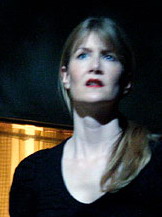 Three hours later Lynch returned to the stage to a standing ovation and prolonged applause. San Rafael Film Center's programmer Richard Peterson stole the first question by way of commenting on Laura Dern's tour de force performance. "Laura Dern may not get an Academy Award," Lynch qualified, "but in a couple of years people will look back on this year and they'll say, definitely, she gave one of the best performances if not the greatest performance in my book."
Three hours later Lynch returned to the stage to a standing ovation and prolonged applause. San Rafael Film Center's programmer Richard Peterson stole the first question by way of commenting on Laura Dern's tour de force performance. "Laura Dern may not get an Academy Award," Lynch qualified, "but in a couple of years people will look back on this year and they'll say, definitely, she gave one of the best performances if not the greatest performance in my book."Understanding that, since Eraserhead, Mary Sweeney has usually done Lynch's editing, Lynch was asked how he came to the decision to edit Inland Empire himself, what the experience was like for him, and what software system he used?
Final Cut Pro, Lynch responded. It's great to work with an editor, he added, but it's so beautiful to get your hands on. You discover things that maybe you wouldn't discover before. That's the feeling, digging down deeper. Now, with the digital world, a filmmaker has so much more control. "I'm never going to go back to film," Lynch announced. "Film is a beautiful medium, so beautiful, but it's a dinosaur. It's heavy. It's slow. It tears. Watermarks. Colors don't match in the prints. The bad ones go to the Midwest and the good ones to New York." He concedes film is beautiful when you get it right but there's so much down time to a film. "You die the death. It's unreal slow and you die. I don't want to die."
 One fellow commended Lynch for the dream-like quality of his films, necessitating repeated viewings, and their Derridean sense where something is always off-center, unseen, but poetically pervasive. "That's very beautiful," Lynch thanked him (even though the audience groaned at the somewhat pretentious mention of Jacques Derrida), "and poetry is a great thing. Cinema is a language that can say abstractions. Like the right combo of words will conjure something magical, cinema has this way of saying abstractions. There are things that are communicated that can't be said in words except by a poet and we feel-think these things, they're so beautiful the language of film. You need a concrete story—you may not say that [Inland Empire] is a concrete story but to me it is a concrete story—holding a certain number of abstractions." Lynch liked the word "Derridean", didn't appear to be that familiar with Derrida, but quipped, "You learn something new every day."
One fellow commended Lynch for the dream-like quality of his films, necessitating repeated viewings, and their Derridean sense where something is always off-center, unseen, but poetically pervasive. "That's very beautiful," Lynch thanked him (even though the audience groaned at the somewhat pretentious mention of Jacques Derrida), "and poetry is a great thing. Cinema is a language that can say abstractions. Like the right combo of words will conjure something magical, cinema has this way of saying abstractions. There are things that are communicated that can't be said in words except by a poet and we feel-think these things, they're so beautiful the language of film. You need a concrete story—you may not say that [Inland Empire] is a concrete story but to me it is a concrete story—holding a certain number of abstractions." Lynch liked the word "Derridean", didn't appear to be that familiar with Derrida, but quipped, "You learn something new every day."Asked about his sound design, Lynch responded, "Sound and picture moving together in time is the most beautiful thing. It's all based on ideas. When you catch an idea, you don't catch the whole thing all at once, but you catch idea fragments and these fragments draw others and it goes like this [Lynch wiggles his fingers like a shimmering wave pattern] and the thing starts building. But it's always following the idea, translating the idea, staying true to that idea. Then, for every single element, you can tell if it's not right. And if it's not right, you can sort of feel—based on thinking about that idea—what will feel correct. So sound, being one element, you get the hard effects and the more abstract effects and music to marry to the picture. I'll feel how music comes in and how it swells and how it goes and how it disappears and something else comes with it. You're getting a feel based on the idea."
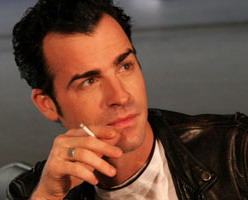 Asked where Lynch gets his ideas—if from dreams, from past lives, from paintings he's seen—he responded that they come from all over the place. When you get an idea, like we all get ideas he explained, something is not there and then—bingo!—it enters your mind. There it is. Whatever the idea is, sometimes they come with such a thrill and you fall in love. You see it in an instant and you fall in love. Then you write it down. The reason you write it down is you don't want to forget it. Even though an idea might come in only a moment, you might write for a long time, several sentences, paragraphs, depending upon the idea. So much comes in one moment. It's such a thrill to be in love and you write it down so when you read it again, it will all come back. Then you just follow that.
Asked where Lynch gets his ideas—if from dreams, from past lives, from paintings he's seen—he responded that they come from all over the place. When you get an idea, like we all get ideas he explained, something is not there and then—bingo!—it enters your mind. There it is. Whatever the idea is, sometimes they come with such a thrill and you fall in love. You see it in an instant and you fall in love. Then you write it down. The reason you write it down is you don't want to forget it. Even though an idea might come in only a moment, you might write for a long time, several sentences, paragraphs, depending upon the idea. So much comes in one moment. It's such a thrill to be in love and you write it down so when you read it again, it will all come back. Then you just follow that.Asked if he remembers his dreams in detail, Lynch asserted he doesn't dream, or doesn't remember his dreams, and basically doesn't get his ideas from dreams. Though he loves dream logic and that's what makes his films so "dreamy."
Asked how much he changes his original ideas in the editing process, Lynch stated that scene by scene, he stays true to his ideas. Then he sees the whole thing and that, a lot of the time, is a major nightmare and a readjustment. Then there are changes for the sake of the whole. At some point he sees the film with other people, not to get notes but to feel it, and that's another nightmare and another bunch of adjustments. He proceeds like that until the whole thing feels correct.
 Asked about his forays into the horrific, Lynch described the world of a film. The horror or torment of a story is strangely as beautiful. "It's a contrast thing." Then he falls in love for a second reason because he sees what sentiment can do to it. It's all "blissful." Peterson commented that Lynch had just written a book Catching The Big Fish, which is about capturing or experiencing bliss through the use of transcendental meditation, which Lynch practices to broaden his creativity. Consciousness is all we have, Lynch replied. We don't think about it much but—if we didn't have it—we wouldn't exist or—if we did exist—we wouldn't know it. "There are people who think that transcendental meditation is a religion or a cult, but it's not a religion; it's a mental technique that allows you to dive within and experience a field that belongs to all human beings, the whole thing. In Vedic science that unified field of oneness that we can all access is called atman. The true self. Know thyself. It's right there for everybody. You enliven that by experiencing it and life gets real real good."
Asked about his forays into the horrific, Lynch described the world of a film. The horror or torment of a story is strangely as beautiful. "It's a contrast thing." Then he falls in love for a second reason because he sees what sentiment can do to it. It's all "blissful." Peterson commented that Lynch had just written a book Catching The Big Fish, which is about capturing or experiencing bliss through the use of transcendental meditation, which Lynch practices to broaden his creativity. Consciousness is all we have, Lynch replied. We don't think about it much but—if we didn't have it—we wouldn't exist or—if we did exist—we wouldn't know it. "There are people who think that transcendental meditation is a religion or a cult, but it's not a religion; it's a mental technique that allows you to dive within and experience a field that belongs to all human beings, the whole thing. In Vedic science that unified field of oneness that we can all access is called atman. The true self. Know thyself. It's right there for everybody. You enliven that by experiencing it and life gets real real good."Frako Loden asked Lynch how his methods of getting his movies into theater houses is changing. "I'm not self-distributing," Lynch responded, "but I'm not going through a regular distribution company on this film. I've got a website and—during the course of the website—I started selling my first feature Eraserhead, short films, and other things and then meeting some great people, making relationships, and getting a conduit into the stores. We thought, wouldn't it be great to have the ability to send Inland Empire that route? Traditionally you go with a distributor because the distributor will give you an advance. But things aren't happening in the movie industry—Inland Empire especially scares distributors (and you understand why)—so advances, like in the music business, are going down. Then when you do all the work distributing a film, you don't get another nickel beyond the advance and so you think, why don't we just try it? And travel to the beautiful Bay Area and meet people and meet the great theater owners and try something different?"
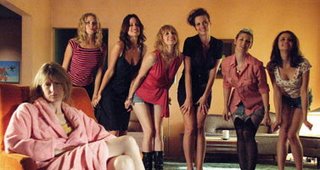 Lynch was asked if the look and feel of digital has changed his filmmaking? He admitted that he started not knowing if he was making anything. He shot scene by scene experimenting with the Sony PD150 for stuff on the website and at first he felt it was a toy camera but then he started liking the camera more and more. He started shooting scenes with it and, as more ideas came and developed into a bigger story, he didn't want to switch horses in midstream, so he stayed with the Sony PD150, which is not hi-def, but low-def. Then he did tests with the low-def upping the resolution to film and he was surprised how good it looked. It had its own feel, not like film, but something he "kind of loved." It reminded him of old 35mm film where you don't see everything so sharp and "it sort of strangely makes room to dream." Further, digital allows him "a tweakability for color." He can work with it before it gets transferred to film. He actually ended up with more control than if he had set up timers. For Lynch it's beautiful and it will only get better. If there's something that's not too sharp or pleasing right now, just like with pro tools there will be a thousand plug-ins he can use to get it to be the way he wants it.
Lynch was asked if the look and feel of digital has changed his filmmaking? He admitted that he started not knowing if he was making anything. He shot scene by scene experimenting with the Sony PD150 for stuff on the website and at first he felt it was a toy camera but then he started liking the camera more and more. He started shooting scenes with it and, as more ideas came and developed into a bigger story, he didn't want to switch horses in midstream, so he stayed with the Sony PD150, which is not hi-def, but low-def. Then he did tests with the low-def upping the resolution to film and he was surprised how good it looked. It had its own feel, not like film, but something he "kind of loved." It reminded him of old 35mm film where you don't see everything so sharp and "it sort of strangely makes room to dream." Further, digital allows him "a tweakability for color." He can work with it before it gets transferred to film. He actually ended up with more control than if he had set up timers. For Lynch it's beautiful and it will only get better. If there's something that's not too sharp or pleasing right now, just like with pro tools there will be a thousand plug-ins he can use to get it to be the way he wants it.Asked what the original concept had been for Inland Empire, Lynch said it would have to have been Laura Dern herself. He was outside and Laura Dern came walking down the sidewalk. She said, "Oh, hello David." He said, "Hello, Laura." She said, "I'm your new neighbor." He said, "No kidding?" He hadn't seen her for a while so it was very pleasing to discover she was his new neighbor. She said, "David, we've got to do something again." He said, "Yes, that would be so beautiful." He started thinking about her and the film got written. Laura stuck with him because, honestly, the first day he showed up with his toy camera, it didn't look like he was really shooting a movie. Later on she saw how beautiful the result was because filming with the Sony PD150 allows 40 minutes of tape, providing the time to discuss and delve into scenes. "Maybe some magic is caught that wouldn't be caught otherwise," Lynch emphasized, "so pretty soon you start falling in love with this thing."
Considering that digital filmmaking is assumedly more cost-effective, Lynch was asked if that opened him up to experiment more with his ideas. No, Lynch answered, it's the same thing—ideas and translating them—it's just that digital filmmaking is more about "getting the thing than waiting for the thing to move around." It's more friendly to the process and the scenes.
Asked how much time it took him to make Inland Empire, Lynch replied three years, two years ("and probably more") of which he didn't know what he was doing.
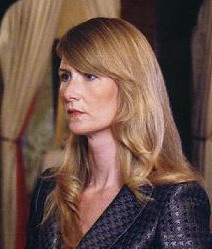 Asked how he had described the role to Laura Dern before shooting, Lynch explained that normally when you begin shooting a film there's a script and the lead actress, especially, knows the whole story; but, with Inland Empire, Dern didn't know what was going to happen and—for that matter—neither did Lynch. But they approached it scene by scene. Within each scene they could identify the character, talk about the scene in relation to the character, locate what they could rehearse, and what they were prepared to shoot. When they went to the next scene, they had the first scene as a point of reference. If you're true to that method of working, Lynch proposed, it doesn't mean that the film will always work out but—if you're true to it—you have a chance.
Asked how he had described the role to Laura Dern before shooting, Lynch explained that normally when you begin shooting a film there's a script and the lead actress, especially, knows the whole story; but, with Inland Empire, Dern didn't know what was going to happen and—for that matter—neither did Lynch. But they approached it scene by scene. Within each scene they could identify the character, talk about the scene in relation to the character, locate what they could rehearse, and what they were prepared to shoot. When they went to the next scene, they had the first scene as a point of reference. If you're true to that method of working, Lynch proposed, it doesn't mean that the film will always work out but—if you're true to it—you have a chance.Inland Empire could be seen as a horror film about Hollywood and so one fellow was curious whether Lynch actually felt about Hollywood that way. No, he answered resoundly. It's just a story that came from ideas. He lives in Hollywood but the idea of the film isn't anything he's experienced or seen or read about. It's just an idea that came that he fell in love with that focuses on one angle of Hollywood. It wasn't even so much that he wanted to make a film about Hollywood. His original idea didn't even have anything to do with Hollywood; but, the film grew out of the ideas. Lynch loves Hollywood. He loves the Golden Age of Hollywood, its magic, and he even likes the way Hollywood fell. But now it's coming back. Digital's here and the Internet is here. Hollywood is always changing and Inland Empire inflects only one part of it, much in a comparable way as Billy Wilder's Sunset Boulevard. A person can enter Sunset Boulevard and feel another whole beautiful world about Hollywood. Films are incredible things that way.
Just out of curiosity, one fellow asked, did you decide to include the rabbit elements in the editing room or when you were generating the story? The rabbits are an idea, Lynch explained, and you don't know where an idea is going to go. It goes one way and then you start thinking and then it goes there. You start one thing and you don't know where it's going to go. It unfolds.
At this point—no doubt exhausted with having to explain his creative vision—Lynch suggested that Chris Isaak return to the stage for another song or two. Ever the jokester, Isaak assured Lynch he would try to keep things moving but had to admit it was a long movie. The weird thing, he added, is that he was listening to the audience's questions without having had the chance to see the movie. Everyone's seen the movie but him. The audience collectively went, "Awwwwww." "I came here and I sang and I didn't get to see the movie. I'll sing again and whatever I have to do to see it." He then asked for hands of how many people liked the movie. Then for how many people understood the movie. Then as a capper to the evening Isaak insisted that Lynch play maracas for the final song, even giving Lynch a maracas solo.
Strange, indeed. Wonderfully, memorably, strange.
Cross-published at Twitch.
01/25/07 UPDATE: Inland Empire will be SF Indiefest's opening night feature on Thursday, February 8, 2007, screening at the Castro Theatre, 7:00 p.m. It then opens at the San Rafael Film Center on February 9, 2007.
01/26/07 UPDATE: Peter Martin's friend Wells Dunbar caught the Austin, Texas, screening of Inland Empire at Austin's infamous Alamo Drafthouse and has contributed Dunbar's reportage of the ensuing Q&A to Twitch. Within Dunbar's masterful synopsis, I really like this description: " 'It's kinda laid a mindfuck on me,' Laura Dern snarls in a bruised drawl, somewhere in the final third of David Lynch's Inland Empire. An impassioned laugh from the audience confirmed she wasn't alone. Hair disheveled, face dirtied and with a bloody bruise edging out from her famously malleable mouth, Dern makes the declaration as one Susan Blue, a beatdown Southern belle fallen on hard times following her marriage to an Eastern Bloc refugee of ill repute. Or something."